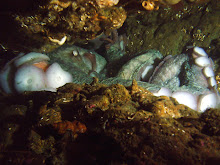
Thursday, December 10, 2009
To Stage or Not to Stage
Yet others, including me, will tell you to NEVER leave your decompression cylinders behind. Same dive as before, 185 for 40 minutes, but you carry your decompression cylinders with you throughout the dive. Now you know where your cylinders are, they are your constant companion and these cylinders will be available in the event you would need them. For example, you have an issue during your dive, you now have additional resource(s) available to you to assist in your decision making process. You and your team enter into a dive that has an aggressive current, poor visibility, or the combination of the two. You may not be able to find your way back to your entry/exit point, or you may not be able to get back to your bottles. A drift dive decompression on a SMB (surface marker bag) may be your only option and without your decompression cylinders this may be a difficult if not impossible task.
Now all that being said, whether you elect to stage your cylinders or take them with you, both procedures are correct. This is a diver preference or better stated a dive team preference. Consider this a mandatory function of your dive team, all members of your team must agree on the procedure for the specific dive prior to each and every dive. So talk it out.
I would like to share a story on this topic. There we were diving some of the most interesting wrecks in the world and we got on the topic of staging or not staging cylinders. Our story teller spoke of a life experience that changed his mind forever on the topic of staging.
We had been told of a dive in the South Pacific, he was the team leader and he was taking 5 other divers with him on this dive. All of the divers had planned their dive and as they had done so many times before planned to stage their decompression cylinders on a descent/accent line at each of the appropriate stop locations. They entered the water and began their dive. They staged their decompression cylinders.
It was an exciting dive and the divers have an opportunity to see a vast majority of this deep wreck. Exploring the inside and exterior they use all of their planned time at depth accruing decompression time. They agreed the dive is at its turn point and they began to make their way back to the accent line. When they arrived at the descent/accent line they found that the line was gone...in fact the entire bow of the ship was gone. Evidently a freak storm had come up. The combination of strong winds, high seas and the weight of the dive vessel had pulled the anchor line so hard that it severed the dive vessel from the wreck taking with it a portion of the bow of the wreck, all of the decompression cylinders, and the accent line. Now 6 divers were in distress and in vital need of decompression gases. Thankfully another vessel was able to answer the distress call and all divers we given access to additional decompression cylinders.
Obviously this is a dramatic example of why you should take your decompression cylinders with you on your dive.
I too believe that on all deep open ocean dives it is a very prudent decision to take your decompression cylinders with you.
Posted by
Miller Diving
at
9:01 PM
![]()
Subscribe to:
Post Comments (Atom)







.jpg)
.jpg)


No comments:
Post a Comment